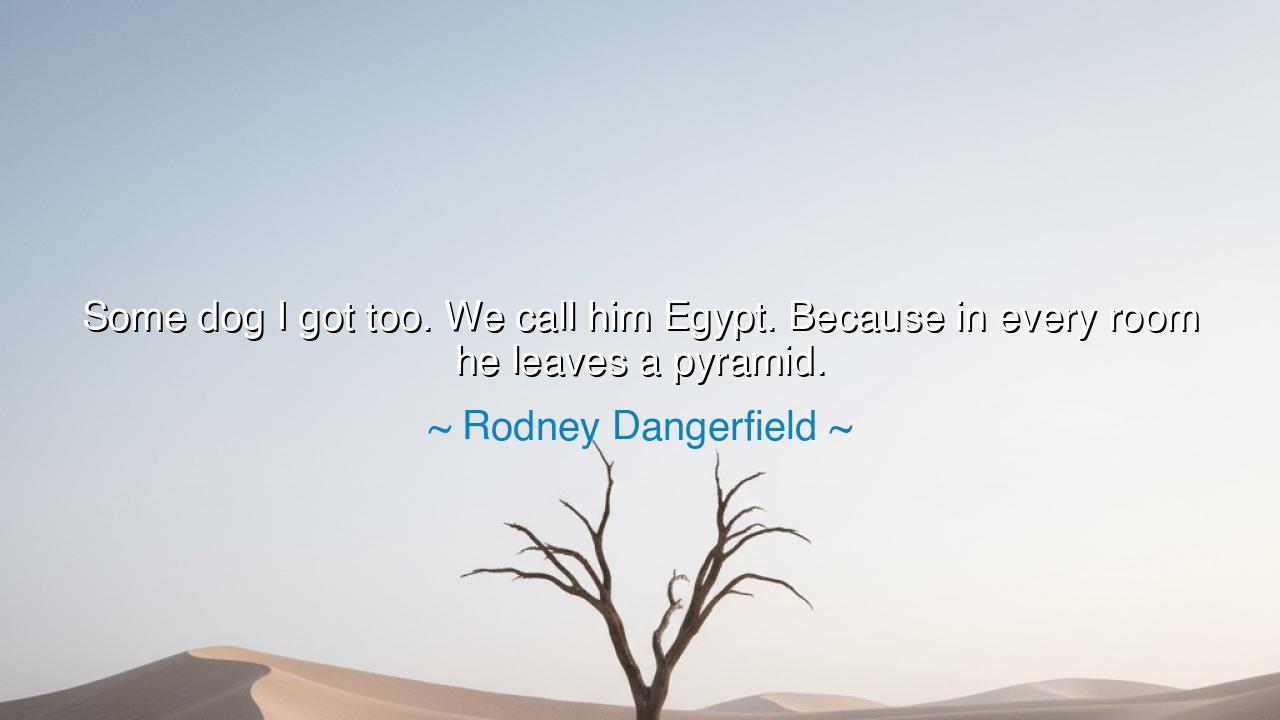
Some dog I got too. We call him Egypt. Because in every room he






Hear, O children of laughter, the words of Rodney Dangerfield, master of jest, who declared: “Some dog I got too. We call him Egypt. Because in every room he leaves a pyramid.” At first, the heart breaks into mirth, for the image is absurd—an animal that leaves behind pyramids, monuments of mischief, in every chamber of the house. Yet beneath this cloak of humor lies a lesson as ancient as the pyramids themselves: that even in the mess, even in the trials of companionship, there is something noble, something enduring, and something profoundly human.
For the dog, that faithful beast, is not always the image of grace. He is sometimes the bringer of chaos, the maker of stains, the architect of disorder. And yet, do we cast him away? No! We laugh, we forgive, we even crown him with a name—Egypt—honoring his folly with humor, not wrath. In this way, Dangerfield reminds us that love is not found in the absence of imperfection, but in the embrace of it. The pyramid, though unwanted, becomes a symbol of the dog’s presence, a mark of his life woven into the tapestry of the household.
Consider the ancients of Egypt, who built their pyramids as monuments of eternity. They endure still, vast and immovable, testaments to human will and vision. Yet in Dangerfield’s jest, the pyramid is not carved of stone but of folly, left not as a monument of kings but as the playful ruin of a beloved pet. It is a comic reversal, and yet the truth shines through: just as the Pharaoh’s pyramids marked their reign, so too do the small troubles of those we love mark the reality of their presence in our lives. To have no pyramids in the house would mean to have no dog, no companion, no bond.
History gives us many tales of imperfection embraced in love. Think of Winston Churchill, whose bulldog Dodo was said to be unruly and stubborn. The dog often disrupted his master’s work, and yet Churchill treasured him, seeing in the animal’s quirks a reflection of loyalty and spirit. Just as Dangerfield turned annoyance into laughter, Churchill turned frustration into affection, recognizing that companionship is greater than inconvenience. Such is the wisdom hidden in jest: patience with imperfection is the foundation of love.
The deeper meaning, then, is this: life will always bring pyramids into your rooms—messes, interruptions, flaws that test your patience. You cannot escape them. What matters is how you respond. If you rage at every imperfection, you will live embittered. But if you laugh, if you see in the chaos the living presence of what you cherish, then you will find joy where others find only irritation. Humor becomes a form of wisdom, and laughter becomes the shield of the heart.
Therefore, let your lesson be clear: do not seek a life scrubbed clean of pyramids, for such a life would be sterile, lifeless, empty of love. Instead, welcome the small imperfections of those you hold dear. Turn trials into stories, and inconveniences into laughter. See the Egypt in your own home, whether it be a dog, a child, a friend, or even your own mistakes, and bless it for reminding you that life is alive, imperfect, and worth cherishing.
Practically, you must train your heart as you train your dog: with patience, gentleness, and humor. When someone you love falters, resist the urge to cast blame. Smile, laugh, remember the bond that binds you, and build monuments of forgiveness rather than walls of resentment. For the pyramids of Egypt stand eternal, but the pyramids of love, built from laughter and patience, endure far longer in the soul.
So, O listeners, remember this: pyramids may clutter your house, but they enrich your life. To laugh at them is to choose joy, to forgive them is to choose love, and to cherish them is to choose wisdom. Dangerfield, cloaked in comedy, has given us this truth: in the end, it is not the absence of trouble but the presence of laughter that makes a home eternal.
––






AAdministratorAdministrator
Welcome, honored guests. Please leave a comment, we will respond soon